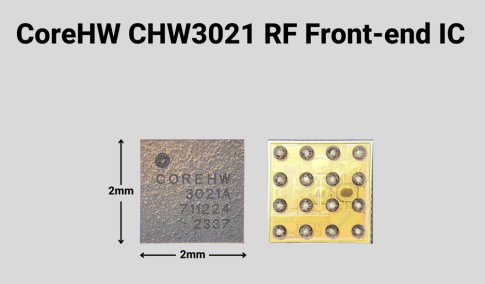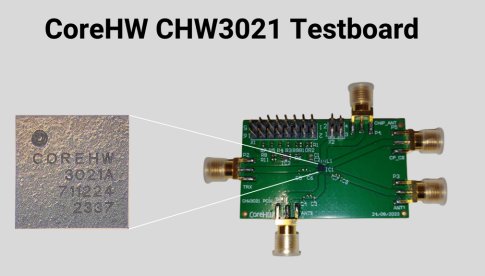Interview: Antti Rauhala Discusses CoreHW's CHW3021 Radio Front-End IC
In this interview, Antti Rauhala, Vice President of Engineering at CoreHW, sheds light on CHW3021, an innovative radio front-end integrated circuit (IC). He delves into its advanced features, potential applications, and how it enhances wireless performance, energy efficiency, and cost-effectiveness across various demanding environments.
Q1: What is CHW3021, and what is its primary function in wireless systems?
CHW3021 is a high-performance radio front-end IC engineered to improve wireless communication by boosting signal range, reliability, and robustness. Featuring an integrated Power Amplifier (PA) and Low Noise Amplifier (LNA), it ensures power-efficient operation. Additionally, its versatile antenna interfaces help optimize signal strength across various scenarios, ensuring reliable wireless performance.
Q2: What are the key components of CHW3021?

CHW3021 combines several critical components to enhance wireless system performance. It includes a power amplifier (PA) and a low-noise amplifier (LNA) that prioritize low current consumption. A high-linearity bypass switch is also integrated, minimizing signal loss. The IC connects to a chip or diversity antenna to maintain optimal signal strength in different applications, providing robust wireless communication.
Q3: What makes CHW3021 stand out in the market?
CHW3021 distinguishes itself with unique features. A notable feature is its fully integrated Chip Antenna design, which offers high performance and stable antenna matching without external components. The IC only requires a DC decoupling capacitor on the supply voltage and a DC-block on the transceiver (TRX), common in devices like Bluetooth® SoCs. Additionally, CHW3021 supports versatile operating modes controlled by GPIO pins, offering three PA control modes and two LNA modes. These features enable developers to optimize performance and power consumption. Its antenna diversity further ensures maximum signal radiation in all use cases.
Q4: How does the integrated chip antenna improve performance?
CHW3021's Chip Antenna focuses on antenna matching for high performance, though it doesn't include the radiating element due to its small size. Its resilience against detuning ensures consistent performance across varying temperatures and manufacturing process variations. This feature is essential in high-demand wireless environments, where reliability and stability are crucial.
Q5: How does CHW3021 address design challenges?

CHW3021 addresses both hardware and software challenges in device design. As a fully integrated single-chip solution, it eliminates the need for external matching components, with internal filtering for transmission harmonics. Its package is IO optimized for easy PCB routing, and with a 0.5mm ball pitch, it supports a wide range of PCB technologies. From a software perspective, CHW3021 features GPIO controls that allow for easy selection of the desired operating mode, simplifying integration into various platforms.
Q6: What are the main applications for CHW3021, and which industries benefit most?
CHW3021 is ideal for compact applications like wireless earbuds, where space for antennas is limited. It enhances signal range, reliability, and robustness in such devices. Its multiple operation modes make it perfect for situations requiring maximum wireless performance with minimal power consumption. Beyond consumer electronics, industries like industrial automation can also leverage its capabilities, particularly in environments where reliable data transmission is critical.
Q7: What support and documentation are available for engineers?
CoreHW provides extensive support for engineers working with CHW3021, including a detailed datasheet, user guides, application schematics, and layout examples. Additionally, S-parameters for RF ports are available to help optimize designs. Our goal is to ensure seamless integration and successful deployment with all necessary resources provided.
Q8: How does CHW3021 handle interference in wireless environments?
CHW3021's LNA is designed with high linearity (IIP3 of 0 dBm and IC11dB of -10 dBm), which helps mitigate interference. If the received signal is sufficiently strong and the LNA is not required, then CHW3021 is programmed to a low-loss bypass mode, offering excellent linearity (ICP1dB=+22dBm). This mode minimizes power consumption while maintaining signal integrity.
In scenarios where the application demands very high interference resilience, a bandpass filter can be mounted between CHW3021 and, for example, a Bluetooth SoC. When the LNA is active, the addition of the bandpass filter has a negligible effect on receiver sensitivity and no impact on radiated output power or current consumption, ensuring the device remains efficient and performs optimally.
Q9: How does CHW3021 optimize power consumption?
The Bluetooth SoC analyzes the strength of the received signal (RSSI or Received Signal Strength Indicator). Based on this analysis, the appropriate operation mode of CHW3021 is selected to optimize current consumption. The active operation modes include three different Power Amplifier (PA) modes, two modes for the Low Noise Amplifier (LNA), and a Bypass mode, allowing for dynamic optimization of current consumption based on the wireless environment. When there is no active Bluetooth communication, CHW3021 automatically enters sleep mode, from which it can transition to active mode in less than 0.8 microseconds. A robust communication link also results in fewer lost data packets, which reduces the need for retransmissions, leading to faster data throughput and optimized current consumption.
Q10: How does CHW3021 balance performance and cost?
CHW3021 is cost-optimized for high-volume production through CMOS manufacturing and wafer-level chip-scale packaging (WLCSP). Its minimal external component requirements reduce both PCB costs and the total bill of materials. Additionally, the software development process is streamlined, with GPIOs simplifying operating mode selection. For example, in industrial automation applications that don't require high processing power but demand reliable data transfer, CHW3021 provides a cost-effective, power-efficient solution.
Final Thoughts
CHW3021 highlights CoreHW's dedication to pushing wireless technology boundaries. With its versatile design and performance optimization, it's an ideal solution for industries needing robust, reliable, and efficient wireless communication. For more information on CHW3021 and other innovative CoreHW products, visit our website at CoreHW. Contact our sales team at sales@corehw.com for inquiries.
About CoreHW
Founded in Finland in 2013, CoreHW is a leading fabless semiconductor company renowned for its expertise in IC technology, covering RF Front-End, Transceivers, mmWave Radar, Photonics, Data Converters, and Power Management, supported by our cutting-edge Antenna designs. CoreHW is the industry leader in Precision Bluetooth AoA and AoD technology, delivering cutting-edge solutions for real-time location systems.
- Visit our website: https://www.corehw.com
- Contact: sales@corehw.com
Related Semiconductor IP
- Configurable CPU tailored precisely to your needs
- Ultra high-performance low-power ADC
- HiFi iQ DSP
- CXL 4 Verification IP
- JESD204E Controller IP
Related News
- Secure Your IC Design Project Slot with CoreHW for Q4 2025 & 2026
- ChipIdea's Analog Front-End for Power Line Communications Modem sucessfully integrated in INSONET transceiver chip
- Chipidea extends its IP Portfolio for Video applications with a new very compact 210MHz Analog Front-End (AFE) in 0.13um CMOS technology
- Darfon Selects Cypress's WirelessUSB LP Radio System-on-Chip And enCoRe II MCUs For Next-Generation Wireless Mice
Latest News
- GlobalFoundries and Renesas Expand Partnership to Accelerate U.S. Semiconductor Manufacturing
- Fraunhofer IPMS develops new 10G TSN endpoint IP Core for deterministic high-speed Ethernet networks
- A new CEO, a cleared deck: Is Imagination finally ready for a deal?
- SkyeChip’s UCIe 3.0 Advanced Package PHY IP for SF4X Listed on Samsung Foundry CONNECT
- Victor Peng Joins Rambus Board of Directors